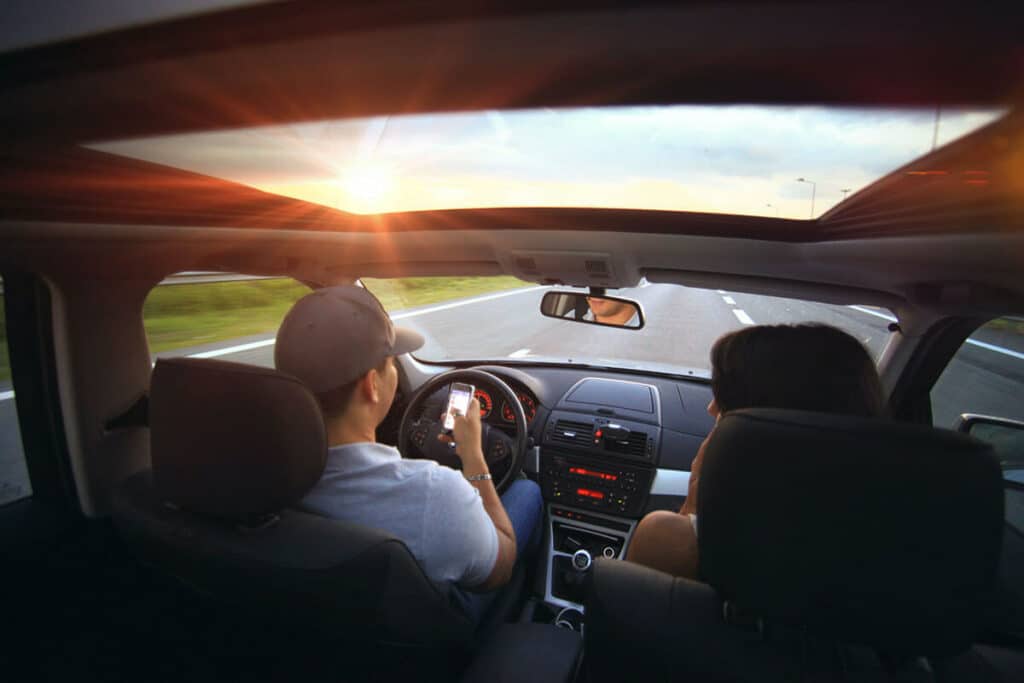About 9% of all traffic fatalities and 25% of all auto accidents occur because of distracted driving. Understanding California’s distracted driving laws can be critical for you and your car accident injury claim because these laws may affect who is determined to be negligent and responsible for the accident. Taking these distracted driving laws and applying them to the facts and circumstances of your case will be an important step for your car accident lawyer in evaluating your chances of recovery.
California Distracted Driving and Cell Phones
Most people know that cell phones are the primary culprit of distracted driving car accidents in California. This is true throughout the country, as texting while driving is a contributing cause of accidents nationwide. However, many people don’t realize that distracted driving isn’t just using a cell phone in the car. Anything within the vehicle, including passengers, reaching for items, adjuding the climate control or radio, eating, health concerns, or anything else that takes your attention away from the road are all forms of distracted driving.
The main issue with using a cell phone while driving is that even the smallest peek can take the driver’s awareness off of the road for long enough to cause an accident. In fact, sending or reading a text takes your eyes off the road for about 5 seconds. At speeds of 55 mph, that’s like driving the length of an entire football field with your eyes closed!
Drivers under Eighteen Years Old
It may come as a surprise that any driver under the age of 18 is not legally permitted to use a cell phone at all while driving. However, this is the reality in California as the law prevents usage of any hands-free products like a headset or Bluetooth for drivers under eighteen year old. In California audio headsets, including headphones or airpods, are also banned for these drivers. Regardless of how a minor uses a cell phone while driving, even using hand- free methods like their parents would, it can still result in a ticket or auto accident. To avoid a ticket or a car crash, for drivers under eighteen years old we recommend having a passenger send your messages for you or, if you are alone, to just wait until you are not driving to use your phone.
When You Can Use a Cellphone while Driving?
The laws in California prohibit any use of cellphones without hands-free devices in most cases, however, there are a few exceptions. If you are on your own private property, you are able to use the phone without breaking the law. Likewise, if you witness an emergency, you may use your cell phone to contact the police or medical assistance while driving. Another exception is if the individual is an authorized emergency vehicle driver such as firefighter, paramedic, or police officer. While it is legal for anyone that is over eighteen may use a Bluetooth device or dial the phone, this may still be looked down upon by law enforcement.Thus, even if you witness an emergency and have a justification to use your cell phone while driving, the safest and best move would be to pull over and then dial 911.
Other Distractions in the Car
As we mentioned earlier, cellphones aren’t the only distractions in a car. Even though it is something people do every day, changing the radio while driving is considered a distraction. Anytime the driver takes their eyes off the road, it is enough time to cause a life-altering car accident. Regardless if it’s adjusting at the radio, changing the climate, falling or moving items in the car, reaching to the backseat for a child can all create enough of a distraction to cause the driver to crash. Those in the car with us are typically the most distracting and can also be cause for distracted driving. These dangers are especially present when the driver is young or inexperienced with the road.
Penalties for Distracted Driving Violations
Unless there is a car accident that causes serious injury or death, the penalties for are relatively minor. A first time offense usually has a fine of $75. A second offense is up to $190. While less expensive than a carpool lane violation, a distracted driving ticket is considered a moving violation. This means it will remain on the person’s driving record, add points to your license, affect your insurance policy premium, and lead to harsher penalties for future offenses.
While the fees for distracted driving are not severe, your risk of being in a car accident is significantly increased with distracted driving. The consequences of a car accident due to distracted driving can be life long, especially if you are seriously injured, or cause serious injury or death to another.
The above laws as well as unwritten “rules of the road” could be applicable to your car accident claim. These may ultimately determine how much financial compensation you are able to seek for medical bills, lost wages, and pain and suffering.
If you’ve been in a car accident and have questions about distracted driving, we are here to help. Please give us a call at (858) 812-2096. We also have a form on our website you can fill out at your convenience and can be reached by email at dan@dhlawinc.com.
Photo by SplitShire.














